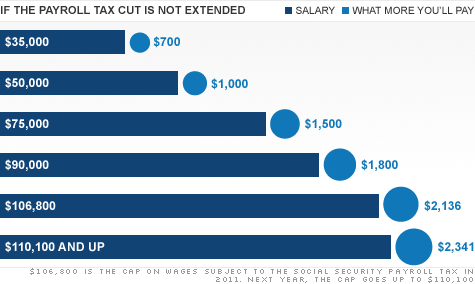
If Congress lets a temporary payroll tax cut expire on Dec. 31, workers next year will pay another 2 percentage points of their income on the first $110,100 in wages.
NEW YORK (CNNMoney) -- Come January, will 160 million American workers owe a) more than; b) less than; c) the same as they've been paying in payroll taxes this year?
The answer will be revealed when lawmakers decide in the next few weeks if they will let a one-year payroll tax cut expire on Dec. 31.
Thanks to the tax cut, employees only had to pay 4.2% of their first $106,800 in wages into Social Security this year, instead of the normal 6.2%.
The impact on your wallet: If the payroll tax cut expires, workers in 2012 will pay the extra 2 percentage points of their income up to the wage cap, which next year will be $110,100.
That means low-income workers will pay several hundred dollars more than they're paying now, while high-income workers will pay roughly $2,340 more.
But some type of extension seems likely, now that both Democrats and Republicans have publicly supported extending the payroll tax cut for individuals.
Still, it's not a done deal, since the parties don't agree on how to pay for the extension. Nor do they agree on the size and reach of the tax cut.
President Obama and Senate Democrats would like to expand the cut so that workers would only pay 3.1%, down from 4.2%.
Senate Republicans, meanwhile, have proposed extending the current payroll tax cut as is.
If that were the case, the impact for workers is that they would see no difference in their payroll tax liability next year.
But if Congress expands it along the lines proposed by Obama, which seems unlikely after Senate Democrats' proposal was rejected on Thursday, workers would pocket even more than they are this year.
For example, those making $50,000 are now saving $1,000 over what they normally pay. If the payroll tax fell to 3.1% next year, they would save $1,550.
Obama and Senate Democrats have also proposed cutting the employer's portion of the Social Security payroll tax to 3.1% on the first $5 million that company's pay in wages. In addition, they would exempt employers from paying any Social Security tax on increases in their payroll -- up to a cap -- in the fourth quarter of this year and all of 2012.
It's not clear if the GOP would support such a break. Republicans in the House are expected to put out their own payroll tax cut proposal next week and the Senate GOP proposal, which was also voted down, was silent on payroll tax cuts for businesses.
The economy: The payroll tax cut for individuals was originally passed at the end of 2010 to help boost the flagging economy.
Given the disappointingly slow pace of recovery since then, however, many politicians and economists are pushing to keep the tax cut in place for another year.
"This is the medicine that we can use in the near term to help strengthen the recovery and to help to provide insurance against shocks that might be coming," said Alan Krueger, chairman of the president's Council of Economic Advisers, during a White House press briefing.
Were the tax cut to expire, many economists say it could take a bite out of their already modest economic growth forecasts for next year and result in job loss.
But relative to other ways to spur the economy, some say a general payroll tax cut isn't the best way since it isn't narrowly targeted to low and middle-income households, which are most likely to spend the extra savings.
"[M]any relatively high-income workers -- who are more likely to save rather than spend some of this windfall -- would benefit. And if the idea is to boost the economy by increasing demand for goods and services, giving the money to savers isn't helpful," Urban Institute resident fellow Howard Gleckman wrote in TaxVox.
The Congressional Budget Office estimates payroll tax cuts would generate between 10 and 90 cents in economic activity for every dollar of budgetary cost.
The tax cut could help increase production and jobs, CBO Director Douglas Elmendorf told the Senate Budget Committee earlier this month. But, he added, "those effects would be spread over time [since] CBO expects that the majority of the temporary increase in take-home pay would be saved rather than spent."
The idea behind a Social Security tax break for employers is to spur hiring. But a recent report from the Congressional Research Service suggested that similar employer tax breaks in the past haven't done as much as hoped.
"Taken together, the results of the various studies suggest that incremental tax credits have the potential of increasing employment, but in practice may not be as effective in increasing employment as desired." ![]()
| Overnight Avg Rate | Latest | Change | Last Week |
|---|---|---|---|
| 30 yr fixed | 3.80% | 3.88% | |
| 15 yr fixed | 3.20% | 3.23% | |
| 5/1 ARM | 3.84% | 3.88% | |
| 30 yr refi | 3.82% | 3.93% | |
| 15 yr refi | 3.20% | 3.23% |
Today's featured rates:
| Latest Report | Next Update |
|---|---|
| Home prices | Aug 28 |
| Consumer confidence | Aug 28 |
| GDP | Aug 29 |
| Manufacturing (ISM) | Sept 4 |
| Jobs | Sept 7 |
| Inflation (CPI) | Sept 14 |
| Retail sales | Sept 14 |